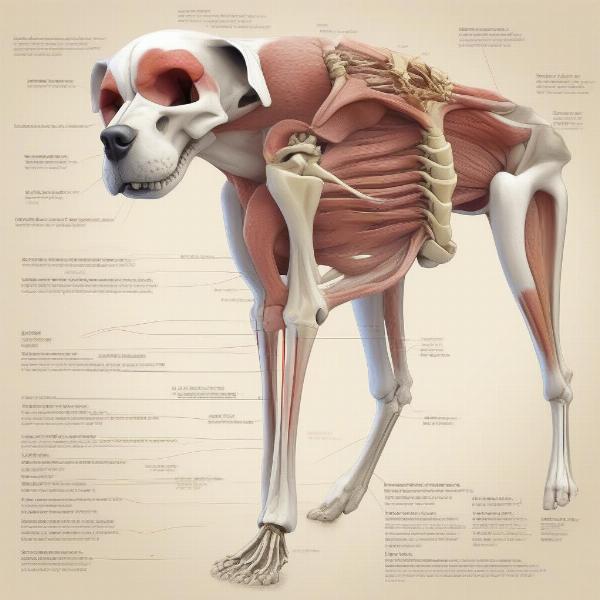A swollen hock in your dog can be alarming, and understandably so. This joint, located on the hind leg, plays a crucial role in mobility. Swelling can indicate various underlying issues, ranging from minor injuries to more serious conditions. This comprehensive guide will explore the common causes of swollen hocks in dogs, the symptoms to watch out for, and the available treatment options. Understanding these aspects can help you provide the best possible care for your furry friend.
Understanding the Canine Hock Joint
The hock joint, also known as the tarsus, is a complex structure equivalent to the human ankle. It’s a crucial hinge joint allowing for a wide range of motion and bearing significant weight. Because of its role and location, the hock is susceptible to various injuries and diseases.
 Dog Hock Joint Anatomy
Dog Hock Joint Anatomy
Common Causes of a Swollen Hock Dog
Several factors can contribute to a swollen hock in dogs. These include:
- Trauma: Sprains, strains, dislocations, and fractures can cause inflammation and swelling.
- Arthritis: Both osteoarthritis and rheumatoid arthritis can affect the hock joint, leading to pain, stiffness, and swelling.
- Infections: Bacterial infections can cause the joint to become inflamed and swollen.
- Hyperextension: Overextension of the hock joint, often during strenuous activity, can result in swelling.
- Cysts: Fluid-filled sacs, known as cysts, can develop around the hock joint, causing noticeable swelling.
- Tumors: While less common, tumors can also affect the hock joint, leading to swelling and other symptoms.
Symptoms Accompanying a Swollen Hock
A swollen hock is often accompanied by other symptoms, which can help pinpoint the underlying cause. These symptoms may include:
- Lameness: Your dog might favor the affected leg or exhibit a noticeable limp.
- Pain: Touching the swollen area might elicit a pain response.
- Stiffness: Reduced range of motion in the hock joint is a common sign.
- Heat: The swollen area might feel warmer to the touch than the surrounding skin.
- Redness: The skin around the hock joint might appear red and inflamed.
Diagnosing a Swollen Hock
If you notice your dog has a swollen hock, it’s crucial to consult a veterinarian for a proper diagnosis. The vet will conduct a physical examination and may recommend further tests, such as X-rays, ultrasound, or joint fluid analysis, to determine the underlying cause of the swelling.
Treatment Options for Swollen Hocks
Treatment for a swollen hock depends on the underlying cause. Options may include:
- Rest and Ice: For minor injuries, rest and applying ice packs can help reduce inflammation.
- Medications: Anti-inflammatory drugs, pain relievers, and antibiotics might be prescribed to manage pain, inflammation, and infection.
- Physical Therapy: Specific exercises can help improve joint mobility and strengthen supporting muscles.
- Surgery: In severe cases, such as fractures or complex joint damage, surgery might be necessary.
Preventing Hock Problems in Dogs
While not all hock problems are preventable, some measures can help reduce the risk:
- Maintain a Healthy Weight: Excess weight puts extra strain on joints, increasing the risk of injury.
- Regular Exercise: Controlled exercise helps maintain joint health and muscle strength.
- Supplements: Certain supplements, such as glucosamine and chondroitin, can support joint health.
- Proper Flooring: Provide non-slip surfaces to prevent slips and falls that can injure the hock.
Conclusion
A swollen hock in a dog can be a sign of various underlying issues. Recognizing the symptoms and seeking prompt veterinary care are essential for ensuring your furry friend receives appropriate treatment. By understanding the causes, symptoms, and treatment options, you can play a vital role in your dog’s recovery and long-term well-being.
FAQ
- What is the most common cause of a swollen hock in dogs? Trauma, such as sprains or strains, is a frequent cause.
- Is a swollen hock always a serious problem? Not necessarily. Minor injuries can cause temporary swelling. However, persistent swelling warrants veterinary attention.
- Can I treat my dog’s swollen hock at home? It’s best to consult a vet before attempting any home treatments.
- How long does it take for a swollen hock to heal? Healing time varies depending on the cause and severity of the swelling.
- Can I prevent my dog from developing hock problems? While not all hock problems are preventable, maintaining a healthy weight and providing regular exercise can help reduce the risk.
ILM Dog is your trusted source for all things dog-related. We provide expert advice on dog breeds, health, training, nutrition, grooming, and much more. Our team of experienced dog lovers is dedicated to helping you provide the best possible care for your canine companion. From understanding why your dog swollen hock joint needs attention to finding the perfect round large dog bed and even a cozy dog ear warmer, we’re here to support you every step of the way. Contact us today for personalized guidance and support! Email: [email protected], Phone: +44 20-3965-8624. ILM Dog is here for you and your furry friend!